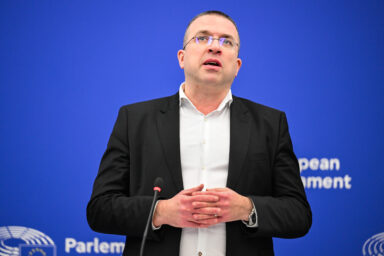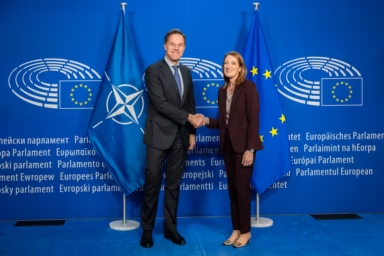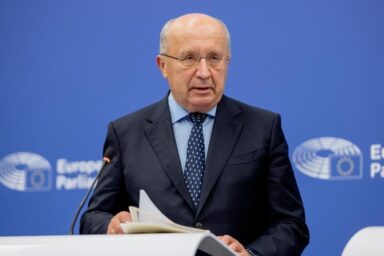What has Europe done to face the growing threat of natural disasters? The BUDG committee of the European Parliament convened at the end of June to answer the question. It addressed several critical issues surrounding EU budget mechanisms for responding to extreme weather events.
The session was marked by discussions on existing instruments, with a keen focus on the urgency of enhancing preparedness and response strategies given the escalating frequency and severity of climate-related events. The presentations and subsequent debates touched upon the effectiveness of current policies, the need for reforms, and the role of the EU in fostering resilience across member states.
Last year’s losses clock in at €45bn
The debate came on the back of a recent report by European Environment Agency (EEA) looking at key climate change impacts and adaptation-and-preparedness actions. It aims to raise awareness both among European decision makers and the public about the urgent need to both mitigate and adapt to climate change and strengthen resilience.
Separately, the EEA briefing ‘Economic losses and fatalities from weather- and climate-related extremes’ found that economic losses from such examples of inclement weather amounted to over €45bn in 2023 (for 38-strong EEA country membership).
Total economic losses from weather- and climate-related events exceeded €790bn across the 38 countries between 1980 and 2023, according to an updated EEA briefing. Losses due to climate-related events were highest (since 2001) in Germany, Italy, France, and Spain. Slovenia has the highest losses per capita.
You might be interested
More severe and costly
The meeting heard an introduction from Lenka Filípková, the EU Director-General for Budget, who highlighted the significance of addressing natural disaster preparedness amid increasing climatic challenges. She noted, “Extreme weather events… are becoming more frequent, more severe, and more costly,” underscoring the consequent imperative for robust budgetary responses and proactive mechanisms. Ms Filípková presented an overview of the tools at the EU’s disposal, such as the Solidarity Fund and various preventive initiatives financed through cohesion policies. These instruments aim to foster climate adaptation, disaster resilience, and prompt recovery efforts.
The Chair detailed the current financial landscape, noting that over €19 billion has been allocated for initiatives under the current Multiannual Financial Framework (MFF) dedicated to disaster prevention and recovery efforts. This budget comprises contributions from the European Regional Development Fund, the Cohesion Fund, and the European Agriculture Fund for Rural Development.
Following Ms Filípková’s opening remarks, the first panel featured two experts: Eulalia Rubio, senior research fellow on European economic affairs at Institut Jacques Delors, and Marco Panigalli, Head of EU Directorate-General‘s unit for European Civil Protection and Humanitarian Aid Operations. Ms Rubio emphasised the essential role that EU budgetary responses play in combating the climate crisis.
Unexpected shocks
Drawing from her research, she outlined three rationales for the EU’s financial intervention: solidarity, added value, and pragmatism. “Solidarity is about helping each other in times of unexpected external shocks,” she stated, highlighting the necessity for member states to assist one another in the face of natural disasters.
Ms Rubio critiqued the shortcomings of current mechanisms such as the EU Solidarity Fund. Despite having a budget of €1.1bn annually, she pointed out that payouts from the EUSF often arrive up to a year after disasters, and typically cover only a fraction of total damages. She remarked, “Between 2020 and 2022, the EU Solidarity Fund covered only three per cent of total damages and 15 per cent of non-insurable damages,” signalling the need for substantial reform.
In her recommendations, Rubio proposed increasing the fund’s size, imposing build-back-better principles for reconstruction, and streamlining application processes to reduce delays. She furthermore suggested that a portion of the Solidarity Fund go towards preparedness and risk reduction. “Advance investment in resilience would yield far greater long-term benefits compared to reactive spending,” she said.
Insurance for less than 20 per cent
Mr Panigalli underscored the importance of preparedness strategies in mitigating disaster impacts. He discussed the Commission’s recent preparedness strategy and the introduction of new measures to promote enhanced cooperation among member states. While acknowledging the relevance of the EU’s Union Civil Protection Mechanism, Mr Panigalli also stressed that its function primarily supports immediate responses rather than long-term disaster mitigation. “The mechanism is a safety net, activated only when national capacities are overwhelmed,” he explained, thereby representing a reactive rather than preventive approach.
Advance investment in resilience would yield far greater long-term benefits compared to reactive spending. – Eulalia Rubio, Institut Jacques Delors
The discussions transitioned to the critical role of insurance in climate risk management. Panelists highlighted the troubling reality that many affected individuals lack adequate coverage for climate-related disasters. Aleksandra Kazmierczak, an expert in climate change and human health at the European Environment Agency pointed out, “Less than 20 per cent of total losses have insurance,” noting that economically disadvantaged groups suffer disproportionately. She asserted that actions enhance access to affordable insurance solutions for vulnerable populations.
Spatial planning
Ms Kazimierczak elaborated on the far-reaching impacts of climate change, asserting that the conflict between increasing urbanisation and climate vulnerability heightens risks. “Every eighth European lives in a potential flood risk area,” she warned, advocating for targeted policies to curb development in high-risk regions. She also called for robust awareness campaigns to educate both communities and local authorities about disaster preparedness.
The dialogue also underscored the importance of spatial planning in effective disaster risk management. Ms Rubio noted the “inflexible bureaucracy” that often hampers quick responses to disasters, citing procedural complexities that delay urgent funding allocation. “Delays in applying for funds undermine the very purpose of solidarity mechanisms,” she lamented.
As the dialogue deepened, members of the European Parliament raised concerns regarding the actual implementation of EU funds at the local level. Various representatives voiced frustrations about the disconnect between EU-wide policies and local responses. MEP Hélder Sousa Silva (EPP/PT) emphasised the need for coherent strategies that engage local authorities in preparedness planning, stressing that community-level readiness is crucial for effective disaster management.
Theoretical and insufficient
Other members raised questions regarding the capacity of member states to activate civil protection measures swiftly. MEP Nicolae-Bogdănel Ștefănuță (Greens-EFA/ROM) recounted a personal experience related to storm preparedness in Ireland, arguing for pre-emptive activation of EU support mechanisms based on early warning systems. “Is it possible for the Commission to activate these mechanisms before a disaster strikes?” he queried, reflecting a broader concern about the need for proactive measures rather than reactive ones.
The second panel featured further insights from experts on climate change and disaster risk management, including Ms Kazimierczak and Marie Evo from the European Centre for Flood Risk Prevention and Management (CEPRI). Ms Kazimierczak reiterated that many existing risk management plans are both theoretical and insufficient in addressing the real-world impacts of climate change. She pointed out that vulnerable groups such as the elderly and economically disadvantaged are hit hardest by climate events, indicating a pressing need for better-targeted policies.
Ms Evo echoed this sentiment, advocating for comprehensive spatial planning and increased collaboration among European entities to create resilient communities. “If we fail to adapt our infrastructure and engage citizens in the conversation,” she warned, “we will continue to pay the price of unpreparedness.” Ms Evo also proposed establishing a European network of experts for knowledge-sharing and best practices in disaster preparedness and response.
Key recommendations
The panel concluded with discussions about the operationalisation of “build back better” principles, which emphasise resilience in reconstruction efforts following disasters. Participants contemplated how to foster a culture of preparedness and whether the current financial frameworks adequately address these pressing challenges.
As the session drew to a close, attendees reflected on the necessity for reform across multiple fronts. Key recommendations included:
- enhanced funding and resources: There was overwhelming consensus that the EU must increase its disaster preparedness budget, including the EUSF, to equip member states better in addressing emergency situations.
- streamlined application processes: Reforming bureaucratic processes to allow for faster access to funds post-disaster was deemed crucial. This would entail modifying application guidelines to encourage quicker payouts
- insurance and risk mitigation: Strengthening insurance coverage for vulnerable populations and incentivising member states to invest in resilience rather than purely reactive measures appeared to be critical strategies
- local capacity building: Emphasis on empowering local authorities and communities to take proactive steps in disaster preparedness featured multiple times. Engaging citizens in awareness campaigns and preparedness planning would foster resilience
- – long-term planning and adaptation: Member states were urged to develop comprehensive long-term plans that incorporate climate risks into spatial planning and urban development frameworks, avoiding repeated construction in at-risk areas
- – cooperation and knowledge sharing: Establishing a robust network for knowledge sharing among local experts, communities, and member states should be prioritised to facilitate dialogue and collaborations that enhance disaster resilience.
Collective response matters
The debate underscored a shared understanding of the immense challenges posed by climate change and natural disasters within the EU. As discussions concluded, the urgency for a comprehensive approach to improve preparedness and response mechanisms was clear.
The main takeaway is that EU institutions, member states, and local authorities must work collectively to create a resilient Europe capable of facing increasingly severe climate events with speed and solidarity. As is usual, the time for robust action and reform is now, and the stakes could not be higher.











